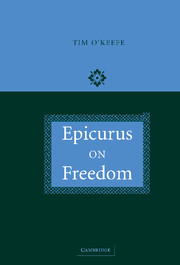Book contents
- Frontmatter
- Contents
- Acknowledgments
- List of abbreviations
- Introduction
- Chapter 1 What sort of an incompatibilist is Epicurus?
- Chapter 2 Lucretius on the swerve and voluntas
- Chapter 3 Aristotle and Epicurus on the origins of character and action
- Chapter 4 Epicurus' reductionist response to Democritean fatalism
- Chapter 5 The swerve and collisions
- Chapter 6 The swerve and fate
- Chapter 7 Epilogue: Epicurus and the invention of libertarian free will
- Appendix: Some texts
- References
- Index
Chapter 6 - The swerve and fate
Published online by Cambridge University Press: 22 September 2009
- Frontmatter
- Contents
- Acknowledgments
- List of abbreviations
- Introduction
- Chapter 1 What sort of an incompatibilist is Epicurus?
- Chapter 2 Lucretius on the swerve and voluntas
- Chapter 3 Aristotle and Epicurus on the origins of character and action
- Chapter 4 Epicurus' reductionist response to Democritean fatalism
- Chapter 5 The swerve and collisions
- Chapter 6 The swerve and fate
- Chapter 7 Epilogue: Epicurus and the invention of libertarian free will
- Appendix: Some texts
- References
- Index
Summary
My argumentation thus far has been partly positive and partly negative. As far as how the swerve is supposed to help secure our freedom is concerned, it has been largely destructive: the swerve is not involved directly in the production of free action; it is not supposed to secure the agent as the archê of either his character or his actions; it is not needed to protect the emergent self from the threat of reductionism. Neither De rerum natura, nor supposed Aristotelian antecedents in the Nicomachean Ethics, nor On Nature 25 allow us to determine the role the swerve is supposed to play in protecting human freedom.
However, many important positive results about Epicurus' views on our freedom can be gleaned from these texts, as well as Epicurean ethics and psychology overall. Lucretius' discussion shows that libera voluntas is what allows us to act as we wish to act, and that it is a sort of intentional impulse. Somehow, if sequences of cause and effect stretched back infinitely in the past, we would not have this libera voluntas, and the swerve saves us from this. Insofar as Epicurus is picking up on Aristotelian antecedents in the Nicomachean Ethics, he would agree with Aristotle that it is crucial that an agent's character and actions have their origin in the agent himself.
- Type
- Chapter
- Information
- Epicurus on Freedom , pp. 123 - 152Publisher: Cambridge University PressPrint publication year: 2005



